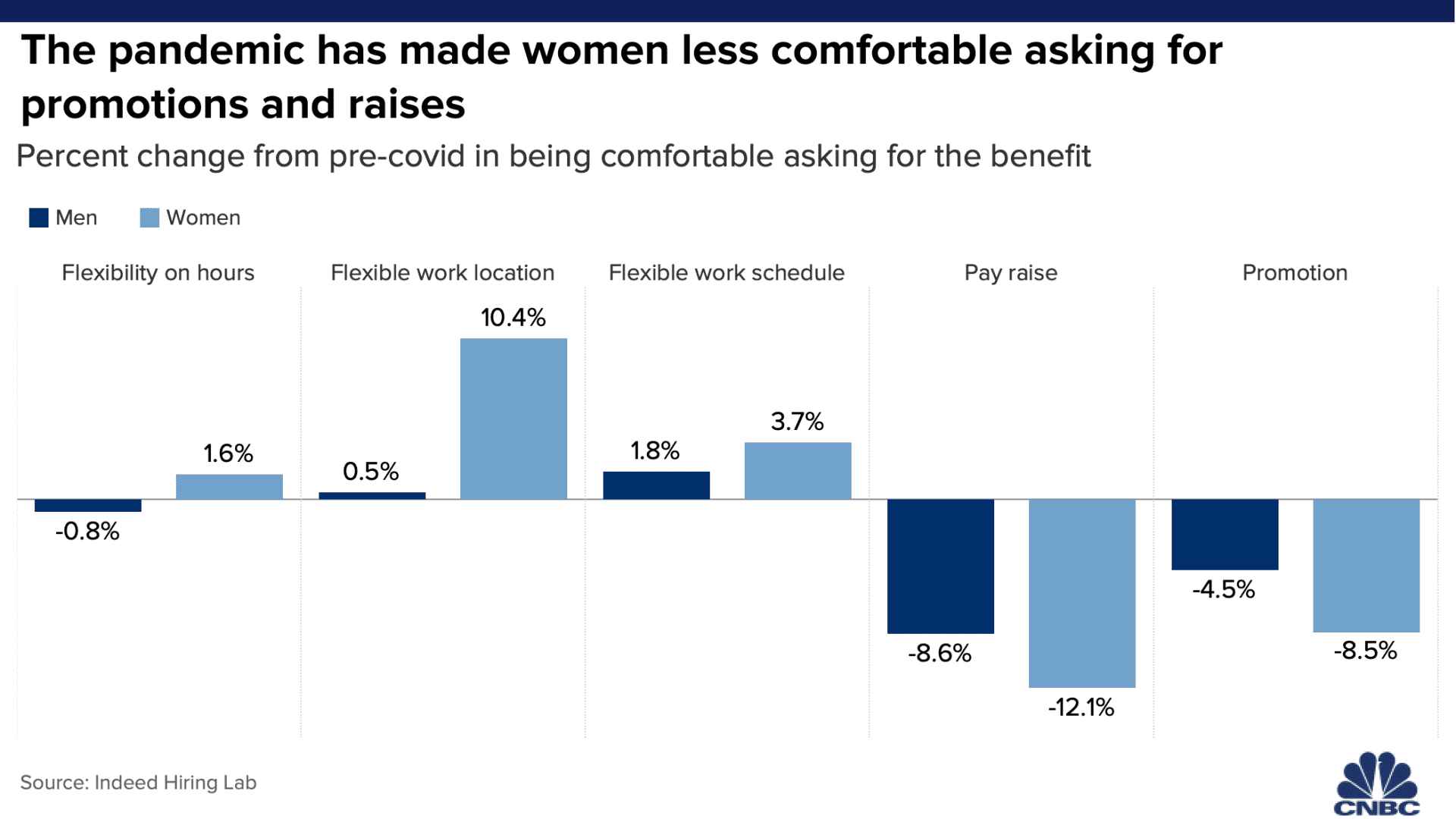
Covid has been hard on women – they've lost more jobs than men, have been overrepresented in higher-risk industries and some have had to juggle work and childcare amid a pandemic.
That's had a negative impact on how women perceive their bargaining power in the labor market. Since the pandemic started, women have become 12.1% less comfortable asking for a raise, where men have only become 8.6% less comfortable seeking more money, according to a study by Indeed Hiring Lab.
"Women and men seem to be talking about the labor market differently," said AnnElizabeth Konkel, an economist at Indeed Hiring Lab and the author of the report, which surveyed 2,000 American adults in December 2020.
More from Invest in You:
Covid bill to waive taxes on $20,400 of unemployment pay for couples
Here's what you need to know about filing an amended tax return
A majority of U.S. women are burned out. Here's how to cope
The study also found that men are more comfortable than women in asking for any benefits in the next 12 months — something that could further perpetuate the pay gap between women and men.
Other studies have similar results. A March survey of college-educated adults by national lending platform Laurel Road showed that while 54% of women said they will ask for a raise this year, 75% of men said the same.
"If men are asking for a pay raise or promotion sooner than their female counterparts are, it is going to be harder for women to catch up," Konkel said. "It's kind of an uphill battle."

There were some bright spots in the Indeed survey. Both men and women are more comfortable with asking for greater flexibility in hours, location and schedule due to the coronavirus pandemic.
Money Report
Get a weekly recap of the latest San Francisco Bay Area housing news. Sign up for NBC Bay Area’s Housing Deconstructed newsletter.
"In a weak labor market, workers generally don't want to rock the boat," said Konkel. "The pandemic really has forced the issue of flexibility, and hopefully it's something that will carry over into the post-Covid era."
And, the Laurel Road survey showed that after the last year, women are more eager to learn about their personal finances, especially women of color.
"We think this past year has pushed women to their limits, but has instilled in them a sense of confidence," said Christina Klenotic, senior vice president and head of brand and strategic partnerships at Laurel Road.
What to do
Still, there are some things that women can do now to close the gaps with their male counterparts at work — especially if they've been employed throughout the pandemic.
In some ways, women are in a very strong position to negotiate and bargain for more in the workplace, according Minda Harts, author of "The Memo: What Women of Color Need to Know to Secure a Seat at the Table."
"Women now have the agency in ways they might not have before to be able to ask for what they want and also interview future employers," she said.
This may be especially true for women of color, especially those in certain industries.
"Given the climate, companies are fighting to do whatever they can to retain the small percentage of diverse employees that they have," said Ariel Lopez, founder and CEO of Knac, a hiring platform.
Just ask
Asking for a more at work can be scary even in a strong labor market, making it even more daunting in a weak one, according to Konkel. Still, women shouldn't put off asking for a raise, promotion or greater flexibility just because of the state of the labor market.
Instead, each person should consider their individual situation and assess if it's the right time to raise the conversation. Some industries and companies have done well during the pandemic, meaning now could be a great time to renegotiate your salary or role.
Regardless of your final decision, Konkel encourages women to at least give it a thought. "Revisit the idea," she said.
To be sure, unemployment in the U.S. is still high. In February, it was 6% for adult men, 5.9% for women and much higher for people of color. Black men saw a 10.2% unemployment rate in February while the rate for Black women was 8.9%. And, the U.S. still has 9.5 million fewer jobs available than it did before the pandemic hit.
"I think that's a big part of the fear for everyone right now," said Lopez. "The answer to that is you have to take risks."
Go in prepared
If you do decide that now is the right time to ask for more in terms of flexibility, pay or your role, make sure that you arrive at any conversation prepared.
That means building a strong business case for yourself, said Lopez, including concrete examples of the work you've done and why you should get what you're asking for.
In addition, if you are making a request, know exactly what you want. What you need out of your workplace might be very different now than before the pandemic, said Lopez, meaning that it's important for individuals to determine exactly what they're asking for.
And don't shy away from asking for everything on your list, even if it feels like asking for a lot, such as more pay and more flexible hours.
"The workplace can walk and chew gum at the same time," said Harts.
If you don't get what you want, reassess
If your workplace can't accommodate you, or help you get on track to eventually achieve the raise, promotion or flexibility you're seeking, it may be time to look for a new job, according to Harts.
While it may be scary to look for a new job in the middle of a pandemic, it is worth it to have the support, pay and flexibility you need.
"It may not feel good if you don't get the response that you want, but it serves your long-term career goals," she said.
SIGN UP: Money 101 is an 8-week learning course to financial freedom, delivered weekly to your inbox.
CHECK OUT: Single mom earns $10,000/month on Outschool: 'I would have never been able to make as much money as a regular teacher' via Grow with Acorns+CNBC.
Disclosure: NBCUniversal and Comcast Ventures are investors in Acorns.






